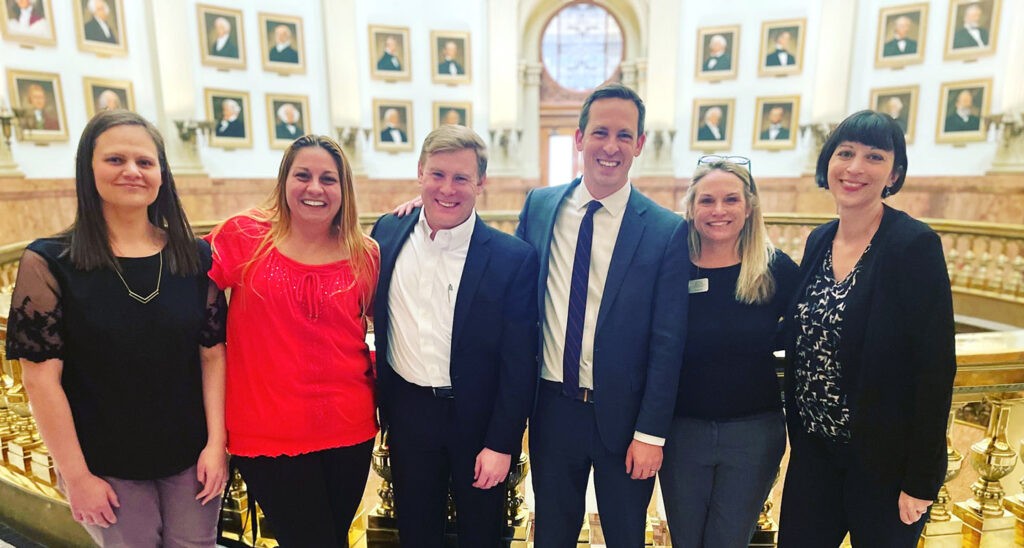
As the sun rose on May 11, 2022, it brought the dawn of a new day for donor conceived people in the United States. The night before, around 10:30 p.m. MT, during a marathon Colorado State Senate session, SB 22-224, the “Donor-Conceived Persons and Families of Donor-Conceived Persons Protection Act,” passed unanimously.
With the bang of the gavel, Colorado made history by passing the first act of its kind within the United States—an act that would abolish anonymous egg and sperm donation. Under the law, for gamete donations made on or after January 1, 2025, donors would have to agree to the release of their identifying information, upon request, to any person conceived through their donations once that person turned 18. Other necessary regulations would kick in as well, including a limit on the number of families established per gamete donor.
The backdrop for Colorado’s action is this: Although similar requirements exist in other Western democracies, including Australia and the United Kingdom, in the United States, third-party assisted reproduction is a largely unregulated multi-billion dollar industry.
At the federal level, the Food and Drug Administration (FDA) only regulates to prevent transmission of communicable diseases (e.g., HIV, Zika virus) through gamete donation. And despite the existence of (nonbinding) industry guidelines established by the American Society of Reproductive Medicine, insomuch as sperm banks are concerned, compliance is underwhelming.
At the individual state level, while California, Connecticut, Rhode Island, and Washington have laws that promote the release of donor identities to adult donor conceived offspring, those states permit donors to opt-out of disclosure. And although New York and California have some licensing requirements for gamete banks and fertility clinics, they do not meet the level Colorado has now established. In short, aside from Colorado, no other state in the Union has taken such bold—and necessary—action.
As an example of just some of the dysfunction in the unregulated industry, in recent years, litigation and legislation have focused on fraudulent assisted reproduction. For example, while SB 22-224 made its way through the legislature, down the road a Colorado jury was busy issuing a $9 million verdict against a fertility doctor who impregnated several patients with his own sperm instead of sperm from a donor. And the day after SB 22-224 passed, Netflix released “Our Father,” a documentary chronicling another instance of doctor-donor fertility fraud.
The concerns of donor conceived people have been ignored for too long, and Colorado chose to be on the right side of history. Colorado listened to the voices of donor conceived people, recipient parents, and donors who shared personal stories and real worries about the third-party donor gamete industry. The legislators listened to witnesses who shared their expertise in live testimony, written testimony, and emails in support of the bill. According to Colorado House of Representatives Minority Leader Hugh McKean (R), the bill “became important because people reached out” and shed light on issues and concerns he and other legislators might never have otherwise had reason to consider.
And in reaching this moment, U.S. Donor Conceived Council listened, too. We listened to our donor conceived peers. We listened to other stakeholders and their concerns. We listened to experts. We listened so that we could find common goals and ground. And we worked together to help Colorado make history.

L-R: Rachel Lemmons, We Are Egg Donors; Christina Spencer, We Are Donor Conceived admin team; Tyler Sniff, USDCC; Senate President Steven Fenberg; Mindy Miller; Erin Jackson, USDCC
VIDEO: Colorado Governor Polis Signs Donor Conceived Persons & Families Protection Act Into Law (SB22-224)
Colorado SB 22-224’s Legislative Journey
The Second Regular Session of the Seventy-third Colorado General Assembly convened on January 12, 2022, and adjourned on May 11, 2022. In the course of that single legislative session, the prospect of enacting meaningful regulatory protections for donor conceived people, their families, and donors went from dream to reality.
January 2022
U.S. Donor Conceived Council and Colorado Senate President Stephen Fenberg begin discussing and drafting potential legislation regarding protections for donor conceived people, their families, and donors. Over the next few months, numerous interested stakeholders are contacted to give feedback on the dozens of drafts.
April 4, 2022
Senate Bill 22-224 is introduced to the Colorado State Senate by Senate President Stephen Fenberg (D) and is co-sponsored by Senator Bob Gardner (R).
April 26, 2022
The Senate Committee on Military, State, & Veterans Affairs hears testimony for and against SB 22-224. The bill is unanimously passed through to the Senate Committee on Appropriations. Listen to the hearing testimony here.
April 29, 2022
The Senate Committee on Appropriations refers the bill to the Senate Committee of the Whole.
May 3, 2022
The Colorado State Senate passes SB 22-224 unanimously on Second Reading.
May 4, 2022
The Colorado State Senate passes the bill unanimously on Third Reading.
May 4, 2022
SB 22-224 is introduced to the Colorado House of Representatives by Representative Kerry Tipper (D) and is co-sponsored by Representative Matt Soper (R).
May 5, 2022
The House Committee on Finance hears neutral and favorable testimony regarding SB 22-224. There is no opposition. The bill is passed on to the House Committee on Appropriations with a bipartisan vote of 9-2. Listen to the hearing testimony here.
May 9, 2022
The House Committee on Appropriations refers the bill to the House Committee of the Whole.
May 9, 2022
The Colorado State House passes SB 22-224 on Second Reading.
May 10, 2022
The Colorado State House passes the bill with bipartisan support, 53-12, on Third Reading.
May 10, 2022
The Colorado State Senate unanimously passes SB 22-224 with House amendments. The bill now heads to Governor Jared Polis’s desk for his signature.
May 31, 2022
Colorado Governor Jared Polis signs the act into law in a ceremony that includes representatives from U.S. Donor Conceived Council, donor conceived people, donors, recipient parents, and mental health professionals.
Gaining Momentum and Support
As the bill progressed through the Senate and House, it gained additional bipartisan sponsors:
Sen. Jeff Bridges (D), Sen. Janet Buckner (D), Sen. Jessie Danielson (D), Sen. Kerry Donovan (D), Sen. Rhonda Fields (D), Sen. Joann Ginal (D), Sen. Julie Gonzales (D), Sen. Chris Hansen (D), Sen. Nick Hinrichsen (D), Sen. Chris Holbert (R), Sen. Sonia Jaquez Lewis (D), Sen. Chris Kolker (D), Sen. Pete Lee (D), Sen. Larry Liston (R), Sen. Dominick Moreno (D), Sen. Brittany Pettersen (D), Sen. Kevin Priola (R), Sen. Robert Rodriguez (D), Sen. Jerry Sonnenberg (R), Sen. Tammy Story (D), Rep. Judy Amabile (D), Rep. Jennifer Bacon (D), Rep. Tracey Bernett (D), Rep. Shannon Bird (D), Rep. Yadira Caraveo (D), Rep. Lisa Cutter (D), Rep. Lindsey Daugherty (D), Rep. Monica Duran (D), Rep. Daneya Esgar (D), Rep. Alec Garnett (D), Rep. Serena Gonzales-Gutierrez (D), Rep. Matt Gray (D), Rep. Leslie Herod (D), Rep. Edie Hooton (D), Rep. Iman Jodeh (D), Rep. Cathy Kipp (D), Rep. Mandy Lindsay (D), Rep. Karen McCormick (D), Rep. Barbara McLachlan (D), Rep. Dafna Michaelson Jenet (D), Rep. David Ortiz (D), Rep. Naquetta Ricks (D), Rep. Emily Sirota (D), Rep. Marc Snyder (D), Rep. Brianna Titone (D), Rep. Alex Valdez (D), Rep. Donald Valdez (D), Rep. Tonya Van Beber (R), Rep. Dave Williams (R), Rep. Steven Woodrow (D), Rep. Mary Young (D).
U.S. Donor Conceived Council is proud to have collaborated with and obtained support from a variety of experts and stakeholders during the progression of SB22-224. Read what supporters say about the landmark legislation.
